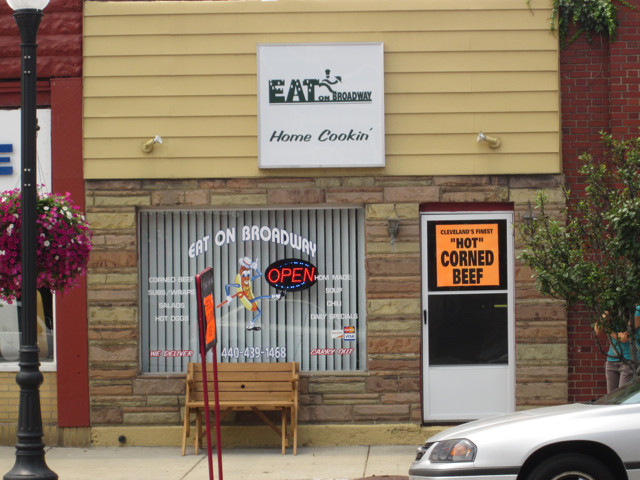I have seen the phrase '"Hot" Corned Beef' on several convenience store signs in my area. Since corned beef is is usually served warm or hot, am I missing part of the meaning of the sign?
2 Answers
It is really a shot in the dark, but your area wouldn't be related with "Broadway" by any chance?
For instance, this blog post describes a restaurant called "Eat on Broadway" (on Broadway avenue, but not at all in New-York), with a sign including:
"HOT" CORNED BEEF
That could be a reference to their specialty, as in:
What's "Hot" on Broadway?

-
3I have noticed that people scatter quotation marks almost randomly throughout signs in these decadent times :)– RemouCommented Dec 5, 2010 at 12:46
-
@VonC Very funny photo, it is from my city, but from the other side of town. Perhaps there is one company making these signs for convenience stores and restaurants in Cleveland, Ohio.– bakoyaroCommented Dec 5, 2010 at 16:30
-
1@bakoyaro: your city?! I wasn't that far in my guess ;) But no "Broadway" relation at all, then? (There could be a "Broadway street" on the other side of town too)– VonCCommented Dec 5, 2010 at 16:33
-
@VonC There is a Broadway Avenue on the other side of town. We also have a city called "Brooklyn" but that has no relation to the borough in New York either. I drove past the store where I saw this sign, and the sign in your picture is identical to the one in the window at the convenience store. The convenience store is called "Ned's Deli", and can be found on Google maps by searching for "West 220th Street and Mastick Road, Fairview Park, Ohio"– bakoyaroCommented Dec 6, 2010 at 4:44
-
@bakoyaro: I also found flickr.com/photos/retrored/4116793215 , flickr.com/photos/retrored/4116793215 , flickr.com/photos/jim_rox_kavanagh/3933960280 : each time with the mention "Old Chicago Brand". Maybe that "Chicago Brand" business is at the origin of those quotation marks?– VonCCommented Dec 6, 2010 at 6:01
Don't rely on signs you see in windows as a usage guide. In standard English, quotes around a word are usually used to distance the writer from its use in some way, normally to cite their usage by someone else or to express doubt about their veracity.
For example, I might write:
"Fred called it 'the best restaurant in New York,' but I've never been there so I can't confirm that."
Here the writer is quoting Fred, and emphasizing that this is Fred's opinion, not his own. For all he knows, Fred is correct, but he has no direct knowledge of the matter in question.
"Fred called it 'the best restaurant in New York,' but this is from someone who eats at Wendy's every day."
Here the writer is quoting Fred and contradicting Fred's assertion.
Now let's consider the sign in VonC's excellent picture:
"Hot" Corned Beef
In standard English writing, this could either mean that someone called the corned beef "hot" or that the speaker means to cast doubt on the assertion that the corned beef is hot. It would very likely imply that the corned beef is not really hot at all. That is why this sign and others like it are funny.
The sign's creator is most likely using (or misusing) the quotes to emphasize the word, and to lead you to believe that the corned beef is genuinely hot (probably in the sense of temperature, as corned beef sandwiches can be served either hot or cold). He or she would have done better to underline the word, or render it in a different color, or use a little more ink and boldface it.
I remember seeing a sign on an ice machine at a cheap motel that said:
"Thanks" for not loosing the scoop!
I presume the writer meant "losing" instead of "loosing"; but the quotes around the first word gave the impression that the thanks were insincere.
In sum, when you see quotes around a word in a sign, it is a fair guess that the writer believes he or she is using them for emphasis. But don't look to signs for English usage lessons.
-
1+1 Don't look to signs for English usage lessons. Marketing in general is inadequate for this purpose. Commented Dec 5, 2010 at 18:16
-
4See also this site for more examples: unnecessaryquotes.com Commented Dec 5, 2010 at 19:01
-
3@Steve Melnikoff: “Thanks” for the link. That website is really “funny”! Commented Dec 6, 2010 at 0:03
-
2the usage of quotes for emphasis, especially in signage, is so widespread now that on descriptivist days I feel quite uncomfortable just writing it off as wrong. I personally find it ugly, horribly jarring, and can’t imagine how it feels natural to any native English speaker; but it clearly does, to many, so we should presumably start trying to accept this and move on. I’d be interested to know the origins, though — how far back does this go, how did it evolve, is it related to the venerable “greengrocer’s apostrophe”, and so on? This must surely have been studied…– PLLCommented Dec 13, 2010 at 5:11
